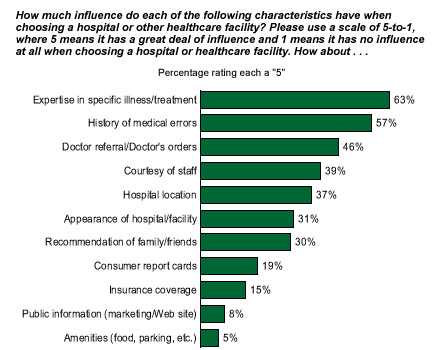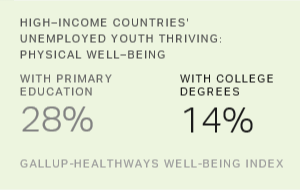First in a series based on the results from the latest Gallup Poll Panel survey on healthcare
At some point in our lives, most of us will need to choose a hospital or a healthcare facility for ourselves or a loved one. But what factors influence our choices? A recent Gallup Poll Panel healthcare survey* gauged the impact 10 characteristics have on respondents' decisions. More than half of respondents indicated that a facility's expertise in a particular area and a facility's history of medical mistakes or errors would influence their decisions a great deal.

Quality Is Key
The two biggest influencers -- expertise in a particular area and the incidence of medical errors -- relate to a facility's perceived quality. In focus groups with Gallup's healthcare clients, we typically find that community members do not necessarily have a preferred hospital for all types of conditions -- many people differentiate healthcare facilities based upon their expertise in treating a particular type of illness. Consumers tend to be open to using multiple hospitals based upon their perceptions of the clinical expertise of each. The other big concern for many community members is the relative incidence of medical errors committed in each of the facilities under consideration.
How Is Quality Judged?
Obviously it's no surprise to see quality-related aspects ranked highly as a criterion for healthcare decisions. The tricky part is getting healthcare consumers enough reliable information to make such assessments. When focus group participants are asked how healthcare quality is judged, the room tends to get silent. Quality measures are given top priority, but the public has only a vague idea of where to find reliable measures or how to use them. As an example, few Panel survey respondents say information sources such as consumer report cards and public information about the facility influence their decisions a great deal.
Trusted primary care physicians may solve this problem for many people -- 46% of respondents say a doctor's referral or doctor's order has a great deal of influence on their choice of hospital.
But others, without access to objective, accessible information, tend to fall back on information they can assess that has meaning for them. Are the people who work at the hospital nice? Is it close to home? Many people have the feeling they should be using criteria related to medical outcomes to make their choices, but, in reality, default to these lesser concerns because they're easier to evaluate.
Bottom Line
Even in the age of healthcare-related Web sites, I don't believe consumers have access to the resources they need to make informed decisions about healthcare facilities based on the criteria they would most like to use. There remains a strong, unsatisfied demand for understandable information on quality of care and incidence of medical errors.
How long will it take to find viable quality education systems? The path to education may start with physicians, who, for various reasons, generally don't want to be held accountable for the information provided. Physicians may believe that the information is too difficult for the public to understand, and that simple reports don't accurately reflect the complexities involved. They also may feel that past data have been misused or misreported. However, none of these reasons justifies missing the opportunity to establish a deeper level of trust with the communities they serve.
*These results are based on telephone surveys with a randomly selected national sample of 1,010 adults in the Gallup Poll Panel of households, aged 18 and older, conducted in September 2005. For results based on this sample, one can say with 95% confidence that the maximum error attributable to sampling and other random effects is ±3 percentage points. In addition to sampling error, question wording and practical difficulties in conducting surveys can introduce error or bias into the findings of public opinion polls.
